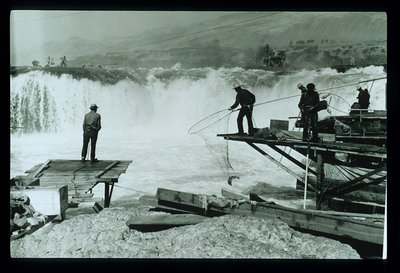
In March of 1957, the gates of The Dalles Dam on the Columbia River closed and Celilo Falls, 8 miles upstream, was covered up within six hours. A March 6 Public Interest Environmental Law Conference panel explored the environmental damage stemming from the flooding of the falls and discussed solutions.
Paul Cienfuegos, an activist with Community Rights PDX, raised the possibility of a community-rights approach to the issue. “I think it’s time for communities along the [Columbia] River, up and down the river, to start imagining what a right-to-water ordinance might look like,” he said.
He singled out other communities that have passed similar ordinances to protect rivers, including Pittsburgh, Pennsylvania, and Spokane, Washington. The ordinances in these cities, Cienfuegos said, enshrine in law the right of a community to clean water and the right of a river to be free of pollution.
In Pennsylvania, a body of water — the Little Mahoning River — is actually being sued by the Pennsylvania General Energy Company (PGE) over fracking wastewater disposal, Cienfuegos said. PGE is suing to reverse a local ban on fracking, and last November, the river joined Grant Township as joint defendants in the case when the Little Mahoning River watershed filed a motion of intervention, according to a press release from the Community Environmental Legal Defense Fund.
Treothe Bullock, of the Celilo Falls Education Fund (CFEF), pointed out that pollution of the Columbia River is an ongoing issue.
When the Bonneville Power Administration proposed lowering the water to expose Celilo Falls in 2005 for the bicentennial of Lewis and Clark’s expedition, the local tribes — including the Nez Perce, Umatilla, Warm Springs and Yakama — were uninterested.
“The tribes said ‘No,’” Bullock said. The reason they refused, he explained, was that exposing the falls did nothing to address the decline in water quality.
Aurolyn Stwyer of the Confederated Tribes of Warm Springs spoke of the history of human settlement at Celilo. She says oral histories include accounts of the great floods that inundated the Columbia River basin more than 12,000 years ago.
“We were one of the largest trading posts on the continent,” she said, adding that archaeologists have traced the origin of an ancient bag discovered near Celilo to the area around modern-day Wisconsin.
Cienfuegos argued that a community-rights ordinance for the Columbia River offers the potential to recognize the legal rights of local people because it disrupts traditional lawmaking. “We’re following in the footsteps of the American suffrage movement, which was illegal,” he said.